Rust programming language
- Pavel Tišnovský, Red Hat
ptisnovs@redhat.com
- Presentation:
- Presentation source:

Table of content
- Requirements to production-ready programming language
- Rust popularity and expansion
- Rust characteristics
- Rust versus C/C++
- Rust versus Go
- Communication with compiler
- Data types
- Other interesting parts of Rust
- Object oriented programming in Rust
- Memory management
- Threads
- Testing
- Package manager (Cargo)
- Selected useful packages
- Deployment
- Interface to Python
- Documentation
Requirements to production-ready programming language
- Program correctness
- Maintainability
- Safety
- Stability of language ecosystem
- Enough developers
- Resource requirements
- More RAM needed -> more expenses in containerized world
- API and ability to communicate with (micro)services
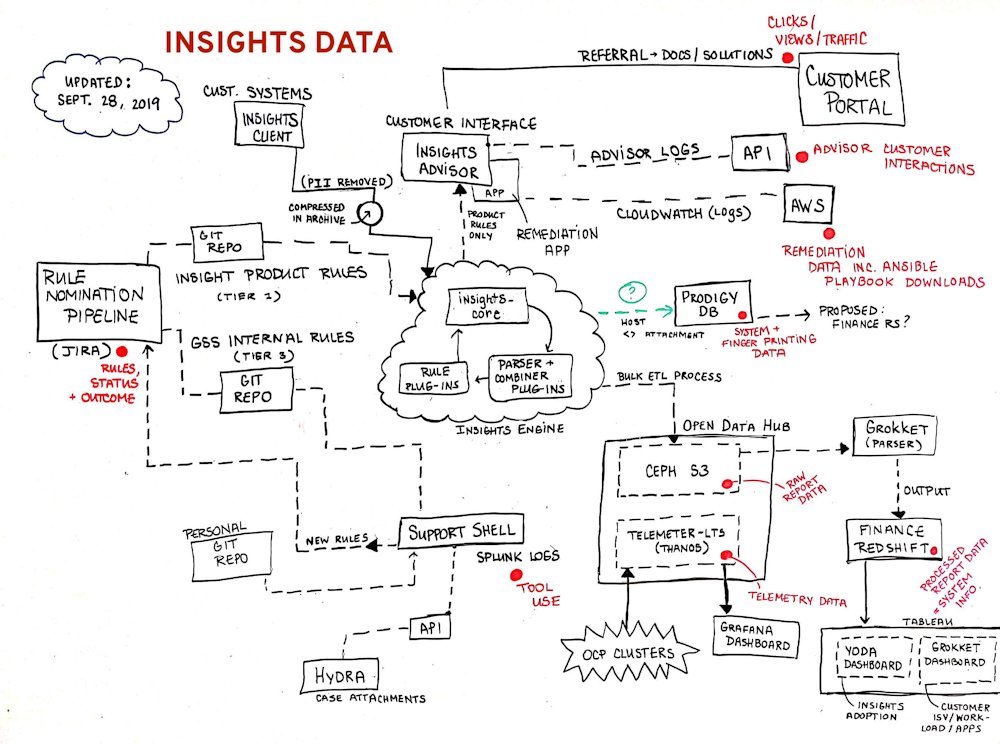
Rust popularity and expansion
Popularity of Rust
- More metrics how to measure popularity
- Tiobe index
- PYPL (PopularitY of Programming Languages)
- OpenHub (for registered repositories only)
- StackOverflow (yearly interrogatory)



Rust expansion
- Again, many statistic available
- should we trust them?
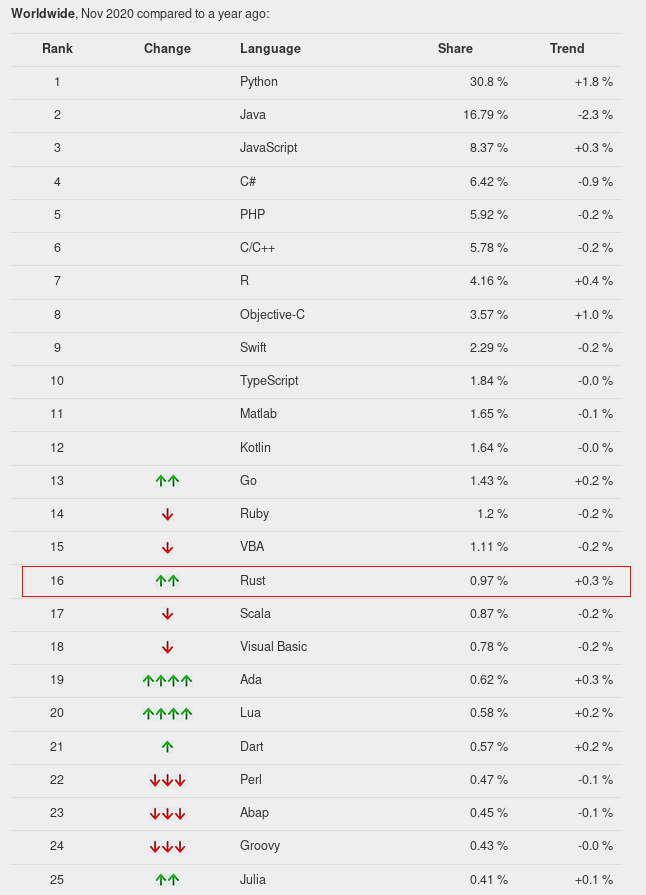
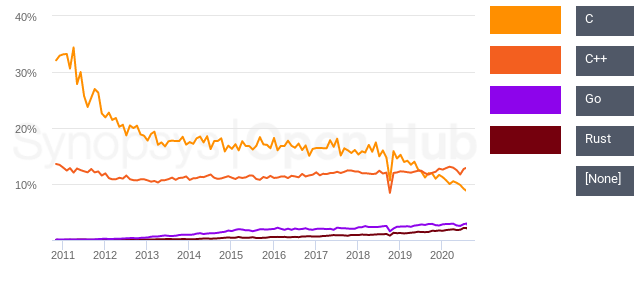
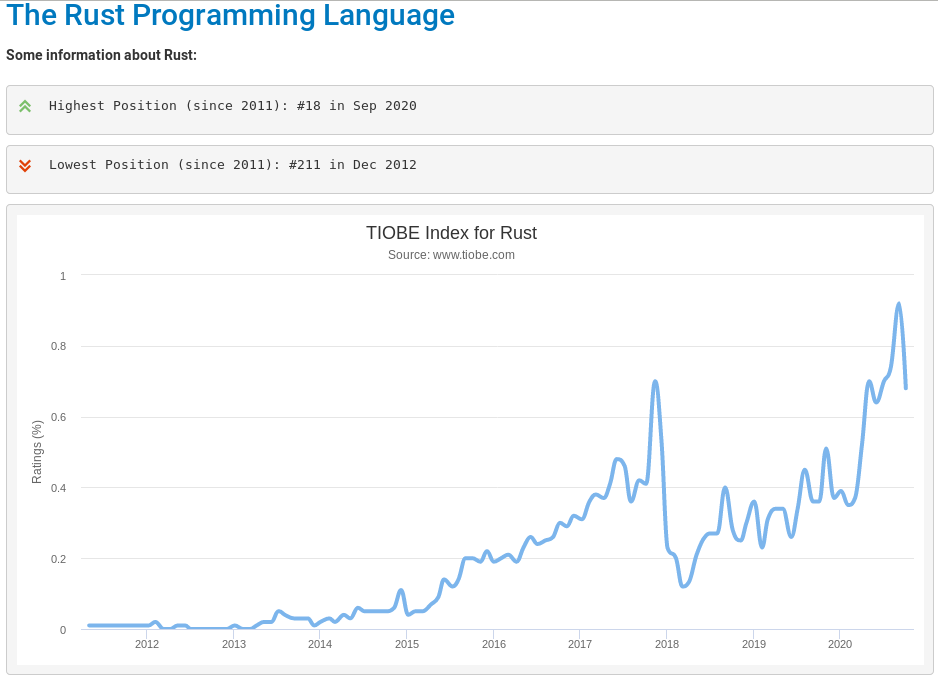
Rust characteristics
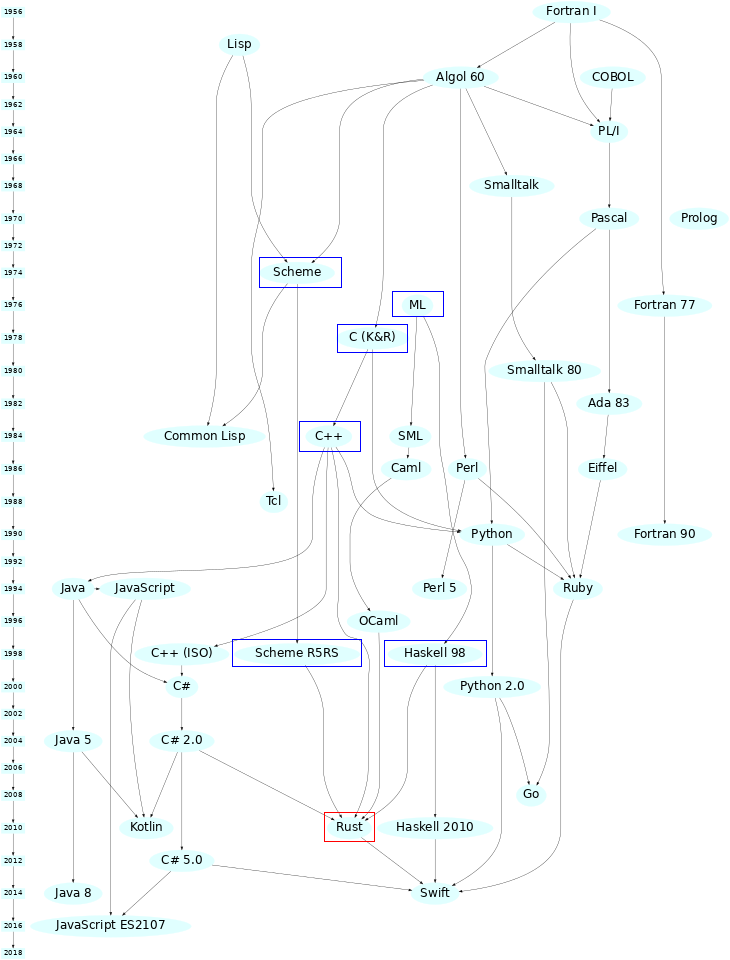
- Goals
- safe applications
- parallelization/concurrency
- performance comparable with C and C++ (even for new features)
- https://benchmarksgame-team.pages.debian.net/benchmarksgame/fastest/rust.html
- good compiler messages
- low level and at the same time high level features
- Don’t repeat the same mistakes made in C/C++ and in Java
- macrosystem
- pointers
- NPE
- strings
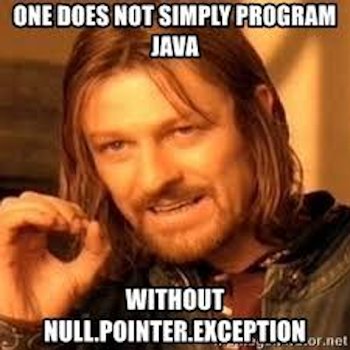
Rust characteristics
- Multiple paradigms supported
- Imperative
- Functional
- some OOP-like properties (but not class-based language)
- Available for all “interesting” platforms
- Linux
- (Free)BSD
- OS X
- Windows
- Supported by many CPU architectures
- i686, x86-64, ARMv6/v7 (32), AArch64, MIPS, PowerPC, S390
- RISC-V
- Bare Cortex-M0, M0+, M1, M4(F), M7(F) bare = w/o OS, core library only
- (even for MSP430 - 16bit MCU!)
- Platform Support (1)
- Platform Support (2)
- Now based on LLVM backend
- Space for more optimizations (WebAssembly via Emscripten or directly)
- https://www.rust-lang.org/what/wasm
- More info
Rust characteristics
- Unicode strings (UTF-8)
- Type inference (similar to Go)
- Very strict type checks
- OOP based on structs and traits
- no classes
- no objects
- no interfaces

- Values life cycle checked by compiler
- ownership
- borrowing
- Safe data handling stored on stack or heap
- NPE is impossible
- “copy” and “move” semantic
- True generics
- Pattern matching
- Functions are first-class types
- lambdas etc.
Rust versus C/C++
(D, Nimrod, …)
- Rust syntax is partially based on C/C++
- Ability to reuse existing ecosystems
- C functions via Foreign Function Interface (FFI)
- C++ libraries (some problems remainded)
- C ⇒ Rust
Rust versus Go

- Probably the are not real competitors
- OTOH some developers think they are
- Started in approximately the same time
- Go presented on 2009
- Rust presented on 2010 (but the theory is a bit olded)
- Both languages focus to solve the (good) old C/C++ problems
- safety with working with memory
- now strict REQUIREMENT
- nobody will be able to develop new language with manual memory management
- multi-thread applications
- strings usable in global environments
- exception states and their detection, control, remediation
- problems with text macros
- safety with working with memory
- Both compiles to native code
- Both have very rich and standard ecosystem
- Strict requirement for modern languages
- pypi
- Ruby Gems
- Rust: Cargo
- Go: started as “one repository, one master”
- now very quickly switched into Go mod world
- Strict requirement for modern languages
Ok, so are Go and Rust real competitors?
- Rust is more focused to C++ and D developers
- Very probably will be more used on powerful MCUs
- Go is more oriented to ?aS world
- Web services
- Net applications
- compete with Node.js, Python, Ruby
And something flame wars related :)
- Source code formatting
- Go authors
- we already deciced, go this way
- better to focus to develop new features
- Canonical format defined
gofmt- tabs etc.
- Go authors
Commmon Rust and Go properties
- Both are supported by companies that compete on web browsers area
- Compiles to native code (libraries, executables)
- Good compiler messages
- non cryptic
- see one char typo in C++ template
- Syntax is similar to “better” C
Rust and Go comparisons from developer perspective
Language Rust Go
Approach modern conservative
Syntax complicated simple, minimalistic
Learning curve lower slope higher slove
Learning curve higher maximum lower maximum
Compiler speed slower faster
Backend LLVM custom
Linking static/dynamic via -buildmode (//export!!!)
Code speed faster slower
Type system huge without generics (yet)
Immutability explicit string, other via interfaces
Memory management ownership GC
Race condition c. yes not direcly
Dependency mngm. cargo Go modules
Final code speed
- Go
- custom compiler
- self hosting
- (bootstraping problem)
- faster compilation
- less optimized machine code
- (llgo project - Go frontend for LLVM)
- Rust
- based onLLVM
- slower compilation
- optimization at the same level as other LLVM compilers
More information
Selected Rust properties

Communication with compiler
- Error messages must be precise and should contain help/hint
- Not all programming languages have this philosophy
- Generate the longest error message in C++
Error messages generated by Rust compiler
error[E0382]: use of moved value: `c`
--> an_example.rs:40:8
|
39 | funkce1(c);
| - value moved here
40 | funkce2(c);
| ^ value used here after move
|
= note: move occurs because `c` has type `std::rc::Rc<Complex>`, which does not implement the `Copy` trait
Second example - many beginners mistakes
fn foo(a int32) {
println!(a)
}
fn main() {
let x:i32 = 10
foo(x);
}
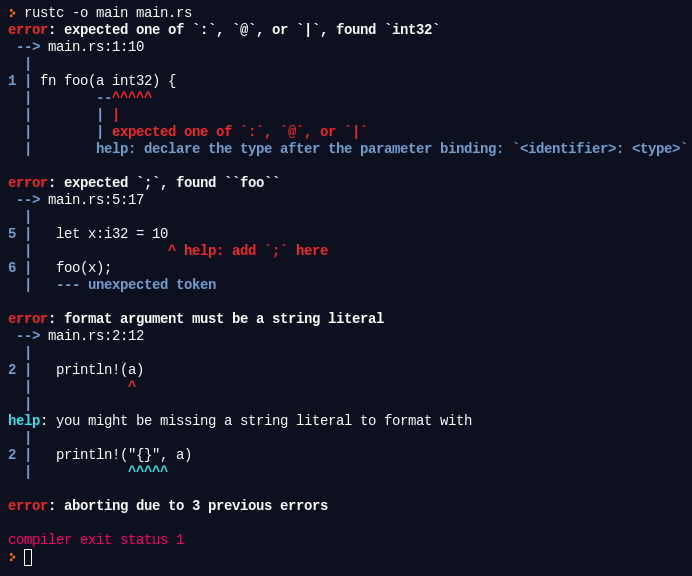
Data types
- Scalars
- integers
i8,u128etc. - floating point
- Boolean
- character
- integers
- Composited
- tuples
- arrays
- structures
- enums
- Derived
- vectors
- strings
- …
Type inference
// macro println!
fn main() {
let x = 6;
let y = 7;
let z;
// now compiler knows types of all variables
z = x * y;
println!("{} * {} = {}", x, y, z);
}
Data type Option
- Used to replace
nullornilusage- Semantically different from
Resultdata type
- Semantically different from
- Two variants:
SomevalueNone
- It is possible to use pattern matching to work with this type
- An example:
fn div(x: i32, y: i32) -> Option<i32> {
if y != 0 {
Some(x / y)
} else {
None
}
}
fn main() {
let z1 = div(2, 1);
println!("{:?}", z1);
let z2 = div(2, 0);
println!("{:?}", z2);
}
Data type Result
- Used to replace
nullornilusage, or special error values- Semantically different from
Optiondata type
- Semantically different from
- Two variants:
OkvalueErrerror value
- It is possible to use pattern matching to work with this type
- An example:
fn div(x: i32, y: i32) -> Result<i32, &'static str> {
if y != 0 {
Ok(x / y)
} else {
Err("Divide by zero!")
}
}
fn main() {
let z1 = div(2, 1);
println!("{:?}", z1);
let z2 = div(2, 0);
println!("{:?}", z2);
}
Data type Result and pattern matching
fn div(x: i32, y: i32) -> Result<i32, &'static str> {
if y != 0 {
Ok(x / y)
} else {
Err("Divide by zero!")
}
}
fn print_div_result(result: Result<i32, &'static str>) {
match result {
Ok(value) => println!("value: {}", value),
Err(error) => println!("error: {}", error),
}
}
fn main() {
let z1 = div(2, 1);
print_div_result(z1);
let z2 = div(2, 0);
print_div_result(z2);
}
Usage of data type Result in computation
fn div(x: i32, y: i32) -> Result<i32, &'static str> {
if y != 0 {
Ok(x / y)
} else {
Err("Divide by zero!")
}
}
fn print_div_result(result: Result<i32, &'static str>) {
match result {
Ok(value) => println!("value: {}", value),
Err(error) => println!("error: {}", error),
}
}
fn inc(x: i32) -> i32 {
x + 1
}
fn main() {
let z0 = div(0, 1);
print_div_result(z0);
print_div_result(z0.map(inc));
let z2 = div(2, 0);
print_div_result(z2);
print_div_result(z2.map(inc));
}
Anonymous functions are values
- First-class citizens in the Rust programming language
fn main() {
let is_odd = |x: i32| x & 1 == 1;
//let is_even = |x: i32| !is_odd(x);
let square = |x: i32| x*x;
for x in 0..10 {
println!("{}*{}={}, {} is {} number",
x, x, square(x), x, if is_odd(x) {"odd"} else {"even"})
}
}
Anonymous functions are values (cont.)
fn main() {
let is_odd = |x: i32| x & 1 == 1;
//let is_even = |x: i32| !is_odd(x);
let square = |x: i32| x*x;
for x in 0..10 {
println!("{}*{}={}, {} is {} number",
x, x, square(x), x, if is_odd(x) {"odd"} else {"even"})
}
}
Other interesting parts of Rust
- Immutable variables
- Initial condition for all values
- Possible to change them via
mut
- Range (
range) - Control structures
- Return value!
- Anonymous functions
- Higher order functios
mapfiltertaketake_whilefold- Infinite sequences
- Pattern matching
- Macros
- Unsafe blocks
Factorial table
- Anonymous functions
- Higher order functions
fn main() {
for n in 1..10 {
let fact = (1..n + 1).fold(1, |prod, x| prod * x);
println!("{}! = {}", n, fact);
}
}
Infinite sequences
fn main() {
let iter1 = 1..;
let iter2 = iter1.filter(|x| x % 2 == 0);
let iter3 = iter2.take(10);
let suma = iter3.fold(0, |sum, x| sum + x);
println!("sum = {}", suma);
}
Pattern matching
- All possible paths needs to be covered by code
- it is checked by compiler, ie in compilation time
// matching (simplest variant)
fn main() {
let x: i32 = 1;
match x {
0 => println!("zero"),
1 => println!("one"),
2 => println!("two"),
3 => println!("three"),
_ => println!("something else"),
}
}
Pattern matching: slightly more complicated construction
// matching, more complicated
fn classify(x:i32) -> &'static str {
match x {
0 => "zero",
1 | 2 => "one or two",
3 | 4 | 5 => "from three to five",
10 ... 20 => "from ten to twenty",
_ => "something else",
}
}
fn main() {
for x in 0..10 {
println!("{}:{}", x, classify(x))
}
}
Object oriented programming in Rust
- Object ownership
- Reference
- „move“ semantic
- „copy“ semantic
- Traits
- Combination trait+structure+methods
- Constructors and destructors
- Trait „Drop“
- Operator overloading
- Overloading = trait implementation
- Generic functions
- More info (in Czech)
Memory management
- Stack versus heap
- Box
- Rc
- Arc
- Arrays and vectors
- slice
Box
- Allocated on heap
- „Envelop“ the object or value (number, structure, array, …)
- Trait Deref - it is possible to access the object/value
- Liveness of objekct and pointer to it
- Can not be
NULL/nil
fn main() {
let x = Box::new(42);
println!("{}", x);
}
let c = Box::new(Complex::new(1.0, 2.0));
// deref
fn print_complex(c: Box<Complex>) {
println!("Complex number: {:}+{:}i", c.real, c.imag);
}
Rc
- Reference-counted envelope over “real” object/value
Rc::clone()- If counter==0, object can be deallocated
- Automatic dereference (
Dereftrait)
fn main() {
println!("main begin");
let c = Rc::new(Complex::new(0.0, 0.0));
c.print();
{
println!("inner block begin");
let c2 = Rc::new(Complex::new(0.0, 0.0));
c2.print();
{
println!("inmost block begin");
let c3 = Rc::new(Complex::new(0.0, 0.0));
c3.print();
println!("inmost block end");
}
println!("inner block end");
}
println!("main end");
}
// one object that is shared three times
fn main() {
println!("main begin");
let c = Rc::new(Complex::new(0.0, 0.0));
c.print();
{
println!("inner block begin");
let c2 = c.clone();
c2.print();
{
println!("inmost block begin");
let c3 = c.clone();
c3.print();
println!("inmost block end");
}
println!("inner block end");
}
println!("main end");
}
Arc
- Also based on reference counting, but thread-safe
- slower than Rc
- but it is possible to use object from multiple threads
Arc::clone()Dereftrait
fn start_threads() {
let c = Arc::new(Complex::new(1.0, 1.0));
for id in 0..10 {
let owner = ComplexNumberOwner { id: id, value: c.clone() };
// move semantic
// because object can live longer than current thread
thread::spawn(move || {
owner.print();
delay(400);
});
}
}
Arrays
- Primitive type in Rust programming language
- Two types of constructors
- It is possible to figure out array length in runtime
- Items are accessed via index/indexes
- Indexing starts from zero
- like in C, Java, BASIC
- unlike in Fortran, Lua
- „Array slices“
- very effective operation
fn main() {
// first type of array constructor
let array = [10, 20, 30, 40];
// array length in runtime
println!("array has {} items", array.len());
// range construct + array length
for i in 0..array.len() {
println!("item #{} = {}", i + 1, array[i]);
}
// for-each loop over array
for i in array.iter() {
println!("{}", i);
}
}
fn main() {
// second type of array constructor
let array = [1; 10];
// array length in runtime
println!("array has {} items", array.len());
// range construct + array length
for i in 0..array.len() {
println!("item #{} = {}", i + 1, array[i]);
}
// for-each loop over array
for i in array.iter() {
println!("{}", i);
}
}
Vectors
- Usually constructed using
vec!macro
fn main() {
// vector construction using macro
let vector = vec![1, 2, 3, 4, 5];
// vector length in runtime
println!("vector has {} items", vector.len());
// range construct + vector length
for i in 0..vector.len() {
println!("item #{} = {}", i + 1, vector[i]);
}
// for-each loop over vector
for item in vector.iter() {
println!("{}", item);
}
// this is even shorter
for item in &vector {
println!("{}", item);
}
}
„Slice“ from array
fn main() {
// array constructor
let array = [1, 2, 3, 4, 5, 6, 7, 8, 9, 10];
// slice constructor
let array2 = &array[2..6];
// iteration over slice
for i in array2.iter() {
println!("{}", i);
}
}
fn main() {
// array constructor
let array = [1, 2, 3, 4, 5, 6, 7, 8, 9, 10];
// slice constructor
let array2 = &array[5..];
// iteration over slice
for i in array2.iter() {
println!("{}", i);
}
}
„Slice“ from vector
fn main() {
// vector constructor
let vector = vec![1, 2, 3, 4, 5, 6, 7, 8, 9, 10];
println!("vector has {} items", vector.len());
// slice constructor
let slice = &vector[3..7];
println!("slice has {} items", slice.len());
}
Threads
- It is required to be able to work with threads
- especially on current hardware
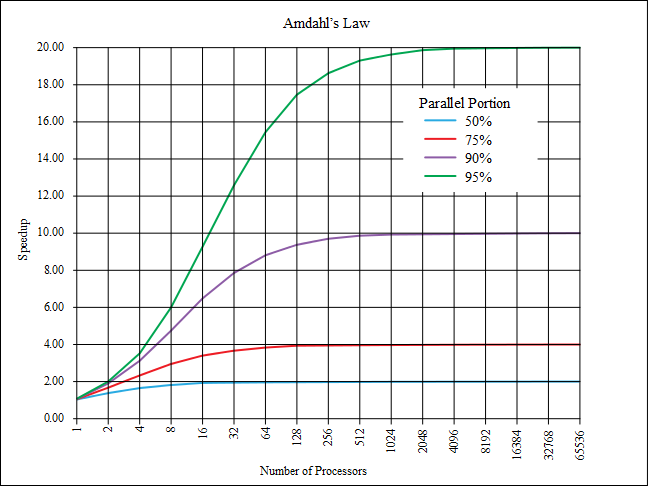
use std::thread;
fn main() {
println!("Starting");
for i in 1..10 {
thread::spawn(move || {
println!("Hello from a thread #{}", i);
});
}
println!("Stopping");
}
Testing
- Applications and services are getting more and more complicated
- CI/CD
- Main problems
A classic test pyramid
- Business part
- Beta tests
- Alpha tests
- Acceptance tests
- Technology part
- UI tests
- API tests
- Integration tests
- Component tests
- Unit tests
- Other tests and related technologies
- Benchmarks
Unit tests in Rust programming language
- Usually started via command
cargo test
#[test]
fn ok_test() {
}
#[test]
fn failure() {
assert!(false);
}
Other tests in Rust
mockiato- mockingmockito- HTTP mockingrust-fuzz/afl.rs- fuzzer based on the great AFL tool
Package manager (Cargo)

Cargo operations
Selected useful packages
Some statistic for this week
Deployment
Interface to Python
Documentation
- Generated from source codes
- Why?
- Source is source of truth
- Markdown supported
- vs Go
Links
- For Complex Applications, Rust is as Productive as Kotlin https://ferrous-systems.com/blog/rust-as-productive-as-kotlin/